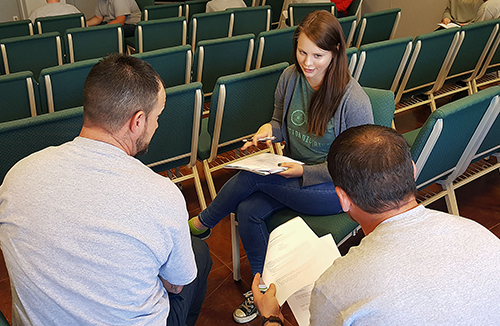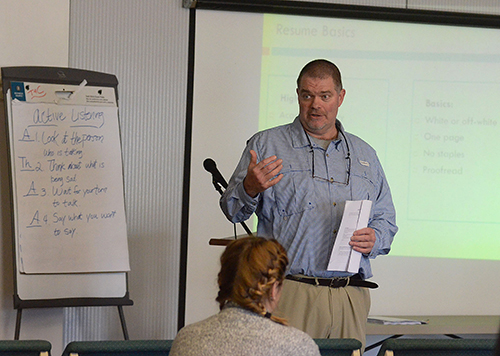MSU, MDOC partner to improve post-release transition
Contact: James Carskadon

STARKVILLE, Miss.—Mississippi State University and the Mississippi Department of Corrections are partnering to improve post-release outcomes for offenders and offer MSU students the opportunity to make a positive impact on society.
In 2017, MDOC launched, with help from MSU, the Noxubee Community Work Center Transitional Program. The 12-week program teaches key life skills to individuals who are transitioning back into communities with the goal of helping reduce recidivism rates in Mississippi. As part of the program, MSU criminology and social work students, under the direction of Professor David May, gain valuable experience by leading discussion groups with the offenders at the Noxubee Community Work Center in Macon. May and Amanda Cook, an assistant professor of criminology at MSU-Meridian, also bring in group speakers every week during the program.
“This is the third class we have been working with,” May said. “The guest speakers come in to present to the men on various topics, and then they have breakout sessions with the Mississippi State students. The idea is that the offenders walk out as graduates of this program and have a smoother transition once they are released.”
MDOC Commissioner Pelicia E. Hall said the MSU-MDOC partnership is consistent with her administration’s goal to transform corrections in Mississippi.
“We can no longer afford to supervise offenders with a gotcha mentality,” Commissioner Hall said. “We must offer meaningful rehabilitation, using all available resources. The partnership with Mississippi State University is beneficial for both the department and the university.”

The program concept came from meetings of the Noxubee Transitional Advisory Board, a group of MDOC officials and university researchers that worked to create a re-entry program at the Noxubee County facility.
Eligible participants are offenders who have violated the terms of their supervision under Earned Release Supervision or house arrest by other than a new arrest or a new charge.
There were 51 graduates combined from the previous two classes. Another 23 graduates are expected when the third class graduates on April 12.
Allie Bosi, a senior criminology major from Memphis, participated in the program last fall. She previously interned at the DeSoto County Sheriff’s Office and mentored at-risk youth as part of a separate program with May. She said her experience with the Noxubee CWC Transitional Program helped her realize she wanted to assist people re-entering society.
“There were lessons on fatherhood, anger management, conflict resolution, resume building, how to keep a job,” Bosi said. “Every week it was a different topic. I formed relationships with my eight guys, tried to put myself in their shoes, and expanded on what the lesson was about. All my guys are out, have jobs now and have approved housing. This program helped me realize I wanted to work with inmates.”
Tatianna Walker, a senior criminology major from Tylertown, plans to go into law enforcement after graduation with hopes of eventually working for the United States Secret Service. Walker said participating in the program helped her understand individuals in the corrections system. For the offenders, Walker said, just having a new face to talk to helped them.
“They kept saying, ‘Thank you for talking to us and listening to me,’” Walker said. “I got that every single week. I think that was the best part for them. We’re getting to hear what they think, their stories. The experience is eye-opening. You never know how much you have in common or what you can relate to, you just have to talk.”
Cook, who holds a doctorate in sociology from MSU, became involved with the program through connections she made while collecting data for her dissertation. She said the program has helped break down stereotypes of offenders and prepared them for a better re-entry into society. The advisory council will continue to look at ways to improve the program and create more beneficial partnerships, Cook added.
“The people we’re helping are people who have made mistakes,” Cook said. “They’re deserving of a second chance, and we’re doing our part to make it better.”
MDOC Commander Frank Stockett, who oversees the work center, said he is happy to see the MDOC-MSU partnership.
“We are no longer doing it the old fashioned way,” Stockett said. “If they violate, we don’t lock them down and don’t give them the tools to be productive citizens. I constantly tell the offenders that we don’t want them here, that we prefer they were out taking care of their families doing what is right.”
MSU is Mississippi’s leading university, available online at www.msstate.edu.